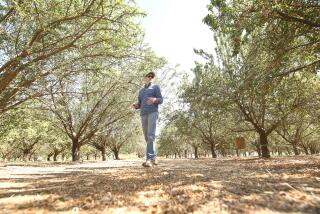Scientists Honored for ‘Biological’ Pest Control Work : Agricultural: Two Americans receive World Food Prize for method now used to fight the Medfly and others.
- Share via
Two U.S. scientists who nearly 40 years ago developed a technique now commonly used to control such pests as the Mediterranean fruit fly on Monday were awarded the World Food Prize in a ceremony in Des Moines, Iowa.
The food prize, which acknowledges contributions to improving the world food supply, is agriculture’s equivalent of the Nobel prizes and carries a monetary award of $200,000.
This year’s winners are Dr. Edward F. Knipling, 83, of Arlington, Va., and Dr. Raymond C. Bushland, 82, of Kerrville, Tex., both retired entomologists from the USDA Agricultural Research Service.
Together, Knipling and Bushland developed the technique in which large numbers of sterilized pests are released to mate with infesting insects, breaking the life cycle and curbing the infestation.
“This is particularly timely now, since in recent years so many people have been frightened about chemicals in the environment and food,” said Norman Borlaug, a Nobel Peace Prize laureate and founder of the food prize. The sterile insect technique developed by Knipling and Bushland is one of the most commonly used “biological” methods of pest control. The team originally developed the method to combat the treacherous screwworm, which infests livestock, especially cattle. They first tested the technique in the 1950s. Since then, the screwworm has been eradicated from the United States, and researchers hope to eliminate the pest in Mexico “within a year and through Panama and into Guatemala within three to five years,” Borlaug said.
In California, the method has been used in a battle against the Medfly, which has threatened the state’s agriculture for more than a decade.
The prize is given by the World Food Prize Foundation, which in turn is sponsored by the John Ruan Foundation. Ruan, a prominent Des Moines businessman, agreed to support the prize foundation in 1990 when it was cut from the budget of the Philip Morris Companies--which had inherited it in a takeover of Kraft-General Foods.
Borlaug won the Nobel prize in 1970 for his work in the “green revolution,” scientific advancements in quality and yields of food crops that have enabled many countries to feed their own populations. When he was unsuccessful in efforts to include an agriculture prize in the annual Nobel awards, he sought business support for the project.
General Foods became the award’s sponsor, and the first prize in 1987 went to M.S. Swaminathan, an Indian agriculture expert who had been an associate of Borlaug’s before leading India’s own “green revolution.”
While the World Food Prize has yet to achieve the international status of the Nobel, it is the most prestigious award in the agricultural community. Borlaug said the award is needed because “we’re up against a pretty serious problem here, with 5.4 billion people in the world to feed and a billion more added every decade. . . . We have to have some of the best young girls and boys coming into related fields in the food system.”






